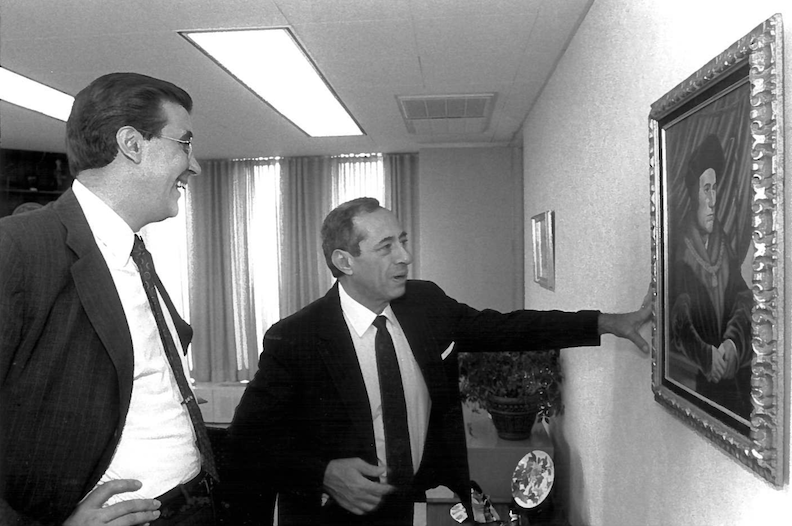Throughout his political career, Governor Andrew Cuomo of New York has been portrayed by fellow pols as a “Prince of Darkness” who relishes being a hatchet man.
He first earned the title working for his father, Governor Mario Cuomo. Later as N.Y. attorney general and governor, his reputation as a mean-spirited cynic without core principles continued to grow.
These traits have been most obvious in his relations with the Catholic Church and its members.
Shortly after taking office in 2011, Cuomo, a baptized Catholic, publicly rejected Catholic teaching that marriage is between a man and a woman, railroaded “marriage equality” through the state legislature, and denounced opponents as bigots.
In 2013, he stuck it to the Church again when he proposed expanding abortion rights, even though New York is the nation’s abortion capital.
Then in January 2014, Cuomo declared that pro-lifers and opponents of same-sex marriage should move out of the state. Such people, he said, are “extreme conservatives” and “they have no place in the state of New York because that’s not who New Yorkers are.”
Even as he excoriated practicing Catholics, Cuomo tried to placate them by promising an Education Investment Tax Credit to help the financially troubled Catholic school system. Despite assurances to Cardinal Timothy Dolan, he threw Catholics under the bus by cutting the tax credit out of the budget to accommodate legislators in the pocket of the teachers’ union.
I’ve been a Cuomo watcher for years, but it was only a few months ago that I finally learned his guide to political behavior: Niccolò Machiavelli.
In an essay titled “How a leader’s philosophy directly affects an organization culture,” Peter DeMarco described a 2007 meeting he attended at the office of the Secretary of Housing and Urban Development: “One of Cuomo’s first acts after taking over as Secretary of HUD in 1997 was to distribute the book by Niccolò Machiavelli, The Prince, to his key aides. . .telling them: ‘This is my leadership philosophy.’”
People familiar with Machiavelli (1469-1527) remember him for arguments that essentially said: the ends justify the means. This, among other teachings, led the political philosopher Leo Strauss to describe Machiavelli as the “teacher of evil.”
Machiavelli’s The Prince is considered the first political science treatise because his approach to governing is based solely on empirical observations, not a guiding philosophy.

Machiavelli rejected the statecraft of Aristotle and Aquinas, arguing instead that the prince should govern according to what will produce success, not by religious or moral principles.
Machiavelli claimed that to govern effectively a secular ruler must “learn how not to be good, and to use this knowledge and not use it, according to the necessity of the case.” He must be prepared to adapt himself “according to the wind, and as the variations of fortune dictate, and. . .not deviate from what is good, if possible, but be able to do evil if constrained.”
A ruler “who abandons what is done for what ought to be done, will rather learn to bring about his own ruin than his preservation.”
Machiavelli believed that the state must operate according to its own logic of power and control, because human beings are prone to violence, selfishness, cowardice, and vengeance. An effective leader must take advantage of human nature to impose his will.
Machiavelli despised the Church. He rejected the Church’s first priority – the salvation of souls and the belief that our first loyalty is to God, not the state. The Church, he held, is an organization for the weak because man’s failures are considered virtues.
In the Discourses, Machiavelli declared:
the pagan religion deified only men who had achieved great glory. . .whilst ours [Catholicism] glorifies more the humble and contemplative men than the men of action. Our religion [Catholicism] moreover, places the supreme happiness in humility, loneliness, and a contempt for worldly objects. . . .These principles seem to me to have made men feeble, and caused them to become an easy prey to evil–minded men, who can control them more securely, seeing that the great body of men, for the sake of gaining Paradise, are more disposed to endure injuries than to avenge them.
Not withstanding his hatred of the Church, he realized it could serve as a tool of the state to restrain the masses. Hence, he argued that the Church must be controlled by the prince and conform its message to the needs of the state. The Church would merely preach official civil theology.
In the 20th century, totalitarian princes took a similar view, banishing religion, denying rights that come from the hand of God, and exterminating millions of innocent human beings – all in the name of progress.
Not a pretty picture. Yet Governor Cuomo, a potential Democratic presidential nominee in 2020, considers The Prince his “leadership philosophy.”
Interestingly, the governor’s father, Mario, despite his many political flaws (not least his self-serving acceptance of abortion rights), took St. Thomas More as a model statesman. In fact, he hung a copy of the Holbein portrait of More in his office and handed it down to his son when he took over as New York’s Chief Executive.
More and Machiavelli were contemporaries. The Prince appeared three years before More’s Utopia. Several historians have argued that Utopia was More’s answer to The Prince. One such scholar, Andre Gushurst-Moore, contends “More’s Utopia stands for reason and natural law against the craft and guile of Machiavelli’s The Prince.” The Catholic historian Theodore Maynard has noted that “More knew long before his death that it was the statecraft of The Prince and not that of the Utopia that was going to decide the destiny of England.” And he lost his life in 1535 because he was “the King’s good servant but God’s first.”
If Andrew Cuomo has the More portrait hanging on his wall, he should in simple honesty, take it down and replace it with the first modern “Prince of Darkness” – Machiavelli.















